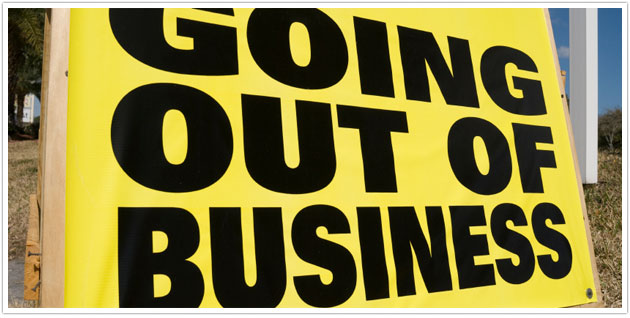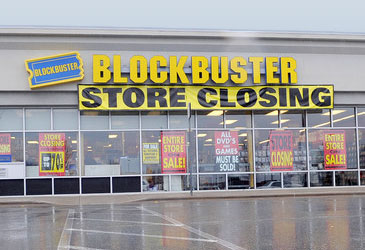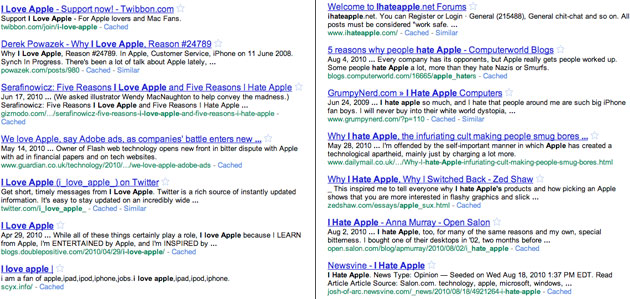Death by Liking
October 2010
By The Author

What if you create a good product that everyone likes? What if you keep feeding the demand by making more and more of that product? What if you maintain this endless rinse-and-repeat cycle with what you know works? What if you never stray from the safety of the familiar?
How could you not be successful?
Blockbuster brands
Simple math will tell you that you will be successful for awhile – years, even – if enough people like your brand.
Therein lies the problem: people like your brand. They choose your product when it's convenient for them. They tolerate it in the absence of a more appealing option.
But what happens when you hit a bump in the road? What happens when a new competitor arrives on the scene? What happens when they realize they can live without you?
Let's ask Blockbuster, shall we?
For years, it was smooth sailing for Blockbuster. At the height of their success, there was a store on practically every street corner. People went there as a course of habit. Going to Blockbuster to rent a movie became as deeply ingrained in our routines as going to the grocery store or the dry cleaner. And it was good to be Blockbuster.

That is, until Netflix happened. Suddenly, the idea of driving to a store and paying $4 to rent a movie for a few days didn't seem like such a nice convenience. Driving it back to the store according to Blockbuster's timetable wasn't so tolerable. People discovered they didn't like Blockbuster quite as much as they thought they did.
One by one, the once ubiquitous blue and yellow signs started disappearing. No one cheered their departure. And no one felt the sting of their absence.
Apple brands
What if you create a product that some people love? What if those people tell everyone who will listen how great your product is? What if they are willing to seek out your product even when they have to pay more or drive farther to get it? What if they still choose your brand even when someone else comes along with an alternative that is cheaper, newer and flashier?
The flip side of that coin is that there will be people who hate you. They'll align themselves with other people who share their hatred. Hating you will become their rallying cry.
How do you survive when you've polarized the market?
Ask McDonald's. Ask Starbucks. Ask Apple.
Hardly anyone is just lukewarm about their fast food preference. For everyone who must have a regular Big Mac fix, there's someone else who will gladly give you an earful about why Wendy's is a far superior choice and they'll never set foot within 100 yards of a McDonald's.
You could stage a re-enactment of West Side Story with the Jets who take pride in bearing the white cup with the green seal and the Sharks who feel their own smug sense of self-satisfaction in sporting the nondescript cup from the locally owned corner coffee shop.
For everyone who evangelizes for Apple, there's someone on another message board tearing them to shreds.

You don't even have to be a computer geek to have a dog in this fight. There's a reason the "I'm a Mac/I'm a PC" ad campaign resonated with people on both sides of the aisle. If you're a Mac, you're a Mac through and through, and you probably own an iPhone and an iPod, too. The Apple brand is part of your identity.
Make waves or drown treading water
Doing things as they've always been done is comfortable and safe. You're not going to offend anyone. But you're not going to inspire anyone, either. Everyone who likes you one day can be gone the next. But people who love you stand by you.
In every industry and in every market, there is the opportunity to be a revolutionary. You don't have to invent the next iPad. You might just develop a network of trustworthy, reliable home maintenance professionals that can be reached with one call to one phone number and dispatched to solve any problem that might arise. You might start a car-buying concierge service that saves your clients the hassle and guesswork of negotiating a car deal. You might bring an
authentic 24-hour French bakery and cafe to a mid-sized southern city.
Everyone who likes you one day can be gone the next. But people who love you stand by you.
Give the
tribe of people who share a passion for what you do something meaningful to rally around. Show them that you understand them and you care about meeting their needs.
Draw a line in the sand. Demonstrate what you stand for. Be equally proud of what you are and what you are not.
Be bold. Be unapologetic. Be arrogant if that's what it takes.
It shows passion. It shows conviction. It's better than being imminently forgettable.
Let go of the safety net of liking. Make waves of love and hate. You'll make the choice for your customers an easy one every time.
Great authors are defined by their ability to set fire to the written word. All too often in today's digital information age, that creative spark is stifled, leaving the Web littered with content that is lifeless and ineffectual. Fame Foundry's Author has made it his mission to revive the act of writing as an art form, harnessing the power of language to command attention and ignite a following. It's the difference between telling a story and building a legend.